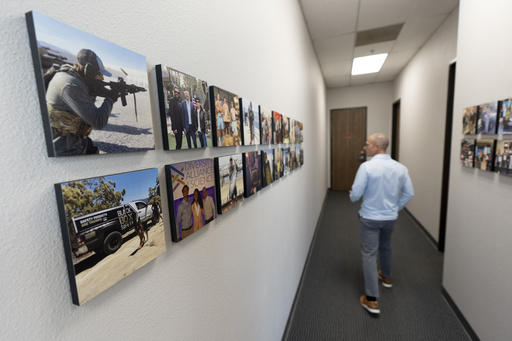
NEW YORK — Numerous veterans embarking on entrepreneurial journeys share a common narrative: while their military backgrounds equipped them with mental toughness essential for business, they often face significant hurdles concerning financial matters.
The term “vetrepreneurs” refers to veterans who establish small enterprises or startups, and according to the Small Business Administration (SBA), they run nearly 2 million businesses that collectively employ 5.5 million individuals across the United States. These companies generate approximately $1.3 trillion in revenue each year. However, the number of veterans engaging in business has been on the decline, as the overall veteran population continues to age. A report released by the SBA in 2023 highlighted a drop in veteran ownership from 11% of all businesses in 2014 to just 8.1% by 2020.
Veterans often bring vital skills to the table, including leadership and strategic thinking, honed during their time in service. Yet, unlike many civilians, they have typically not amassed the same levels of credit or personal savings, resources that banks heavily utilize when evaluating loan applications. The additional mental strain of adjusting from military to civilian life further complicates their transition.
Data from SCORE, a nonprofit dedicated to business mentoring, reveals that around one-third of veteran-owned businesses encounter challenges related to capital access or lack of financing, a much higher percentage compared to non-veteran-led firms, where only a quarter report similar issues.
Despite these struggles, opportunities abound for veterans seeking assistance. SCORE’s CEO, Bridget Weston, emphasizes that numerous organizations exist to aid veterans in navigating their business journeys, from nonprofits aimed at enhancing financial literacy to specific loans and grant opportunities, as well as contracts designated for veteran and disabled veteran-run businesses.
The SBA is often a pivotal starting point, offering a certification program for veteran-owned and disabled veteran-owned businesses that may facilitate access to loans and federal contracts.
Jackson Dalton is an example of a veteran who successfully leveraged this path when he founded Black Box Safety, a company specializing in personal protective equipment, in 2017. After serving in the U.S. Marines and facing a medical retirement due to an injury, Dalton transitioned to civilian life, obtained a master’s in public health, and spent a decade in the health and safety sector. When he decided to pursue entrepreneurship, he targeted federal contracts and obtained certification from the SBA, noting a specific interest in contracts awarded to disabled veteran-owned entities. His initial contract, which involved supplying gloves to a Minnesota prison, marked the beginning of his flourishing business that now serves significant clients, including the Department of Veterans Affairs and the State of California.
Dalton attributes much of his success to the resilience and adaptability skills he cultivated during his military training. He remarked, “The skills and attributes that I picked up in the military were resilience and grit and the ability to adapt, improvise, overcome when encountering resistance or obstacles and barriers.”
Veteran-focused nonprofits provide another valuable source of support. Adam Isch, a Marine Corps veteran who served two tours in Iraq, turned to Warrior Rising, a nonprofit in Salt Lake City, where he secured mentorship for his startup, Isch Body Works in Fort Worth, Texas. His company specializes in men’s hygiene products, with a portion of the revenue directed towards charities that assist Texas children in foster care or awaiting adoption. He encourages other veterans to seek mentorship from similar organizations: “There are people who are doing what you do. They’re doing what I do, and they love it and they want to talk about it.”
For some, access to veteran-specific loans is crucial for their business’s survival. Elizabeth Gore, co-founder and president of Hello Alice, a fintech firm supporting small businesses, emphasizes that veterans often face a tougher landscape regarding capital accessibility compared to other populations.
John Griveas, a former Navy SEAL who served in the mid-1990s, experienced various job transitions after his military service. It wasn’t until 2015 that he, alongside his partner Jackie, launched Fetch! Dog Treats, a business that focuses on selling all-natural dog treats. His company now distributes products to approximately 300 independently owned retailers and even the Venetian Hotel in Las Vegas. Griveas acknowledges the significant challenge of securing funding, but credits a timely $10,000 grant from the FedEx Entrepreneur Fund, in collaboration with Hello Alice, as a pivotal boost for his business during a critical moment when he needed to relocate.
“It was something that quite literally was going to end us,” he recalled. “And when that grant came through, it was literally a lifesaver for us.” Griveas urges fellow veterans to utilize the resources available to them: “There’s tons of resources out there, whatever it might be that helps you get through the day-to-day, because there’s a lot involved with running a business.”
